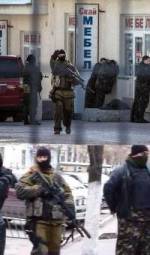Human rights groups oppose current draft bill on amnesty for separatists

NGOs are proposing important amendments to the current draft law aimed, among other things, at ensuring that criminal investigations are carried out and issues of compensation for victims resolved, before liability is waived.
A number of human rights organizations have signed an open appeal to Ukraine’s Prime Minister, parliamentary speaker, heads of parliamentary factions and MPs regarding an amnesty bill tabled in parliament. They stress the need to make amendments to the draft law on waiving prosecution and punishment of people in connection with mass acts of civic resistance beginning on Feb 22, 2014.
The letter expresses the organizations’ concern at legislative initiatives introduced in fulfilment by Ukraine of its commitments under the Geneva Agreement with the EU, USA and Russian Federation on April 17, 2014. This envisaged, they say, application of an amnesty to participations in the conflict who did not commit grave crimes*
In fact, however, the draft law produced, No. 4667-3 is not essentially an amnesty law since amnesty waives punishment for certain categories of people who have committed crimes, whereas this law proposes to waive any liability, prevent investigation into a whole range of criminal proceedings, and therefore to make it impossible to establish who was guilty of carrying out the crimes. This in turn, the authors point out, means that the victims of such crimes will not be able to receive victim status nor to obtain compensation. They will be forced to independently investigate the crime with the burden of proof being on them to prove the damage caused. This is unacceptable, meaning that in practice victims will not be able to gain compensation.
The NGOs stress that the law must also meet Ukraine’s other obligations, including under the European Convention on Human Rights, as well as Ukrainian legislation.
This is at present not the case.
The draft bill as it stands now will waive liability for grave crimes which is in direct violation both of the European Convention and Ukrainian legislation.
“Adoption of draft bill No. 4667-3 in its present form will not reduce tension in society, but will on the contrary arouse a wave of indignation and exacerbate conflict. Waiving of punishment for crimes, some of which are grave or particularly grave will merely fuel impunity for crimes against life, health, honour, dignity and freedom in the East and South of Ukraine. Infringements of the rights of victims of crimes could lead to a new wave of reprisals or lynch law.”. The state will also have to take upon itself compensation for the crimes committed, with this not presently allowed for in the Budget.
They point out also that the law provides no clarity as to whether foreign nationals will have liability waived for crimes committed, including in the Crimea.
Another problem they perceive is that seen with the ‘amnesty law’ proposed by Viktor Yanukovych back in January. The waiving of liability is contingent upon the people involved laying down their arms and vacating seized buildings. The NGOs believe this to be holding them to ransom and placing the Ukrainian government on a par with pirates and terrorists.
They propose the following amendments:
1. Bring the draft law into line with the law on applying amnesty in Ukraine;
2. Exclude Article 3 and establish the need for investigation of all crimes, finding the culprits and establishing that the actions were illegal, and only then, waiving liability;
3. Establish that liability in criminal proceedings with respect to crimes in which damage was done to others can only be waived on condition of reconciliation with the victim and full compensation of the damage caused.
4. Restrict the range of individuals covered by the law to include only Ukrainian nationals and stateless persons, and also place a territorial limit on the crimes which fall under the amnesty – the Luhansk and Donetsk oblasts and Odessa. Article 1 should state that liability is waived only if their actions did not constitute grave or especially grave crimes.
The signatories are the Ukrainian Helsinki Human Rights Union; the Centre for Civil Liberties; the Kharkiv Human Rights Group; the Social Action Centre; the Human Rights Information Centre; Civic Initiate; and the Youth Human Rights Group in Kharkiv.
* The original translation into Ukrainian was not, in fact, correct, since the original speaks only of ‘capital crimes’. See: Geneva endorsement of impunity





